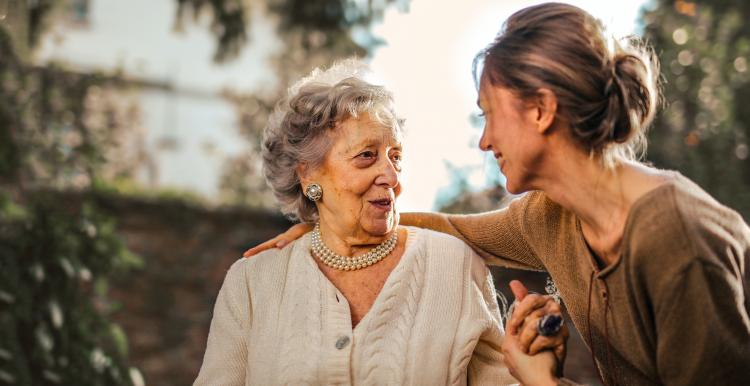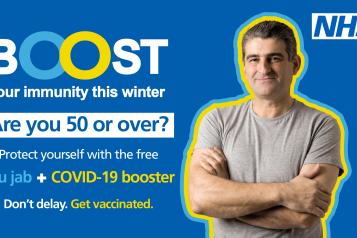Advice for caring for a friend or family member during a pandemic

Coronavirus restrictions
The Government regularly reviews restrictions. Read the guidance below to find out what you can and cannot do:
Protecting yourself and the person you care for
If you, or the person you care for, have no symptoms then please refer to the guidance on hygiene on the NHS website, which says:
Do:
- wash your hands with soap and water often, for at least 20 seconds
- use hand sanitiser gel if soap and water are not available
- cover your mouth and nose with a tissue or your sleeve (not your hands) when you cough or sneeze
- put used tissues in the bin immediately and wash your hands afterwards
- clean objects and surfaces you touch often (such as door handles, kettles and phones) using your regular cleaning products
- consider wearing a face covering when in shared spaces
- keep windows open in the room you're staying in and shared spaces as much as possible
Do not:
- share towels, including hand towels and tea towels
Please see specific situations below for what to do if you or the person you care for display symptoms.
Getting vaccinated
Covid-19 vaccination
- If you belong to any of the following groups, you can book a vaccine online click here or by calling 119:
- you're aged 12 or older
- you're at high risk from COVID-19 (clinically extremely vulnerable or clinically vulnerable)
- you have a learning disability
- you're a carer for someone who would struggle to cope if you became unwell (If you have not already been invited speak to your GP if you to get added to their list)
You can book a Covid-19 booster dose if you are:
- aged 18 years old and over
- aged 16 years old and over with a health condition that puts you at high risk from COVID-19
- frontline health and social care workers
- All people aged 18 to 29 years old will be eligible to book a booster dose from Wednesday 15 December.
Unpaid carers who are eligible for a booster but have not been called should contact their GP practice. We also encourage all unpaid carers who do not have a ‘carer’s flag’ on their primary care record to make themselves known to GP practices as this provides a sustainable approach for identifying unpaid carers for any future vaccinations.
For further information, please see the standard operating procedure for COVID-19 vaccination deployment for unpaid carers and guidance about COVID-19 on GOV.UK.
Flu Vaccine
Unpaid carers may also be eligible for a flu vaccine free on the NHS. The flu vaccine is given free on the NHS to people who:
-
are 50 and over (including those who’ll be 50 by 31 March 2022)
-
have certain health conditions
-
are pregnant
-
are in long-stay residential care
-
receive a carer’s allowance, or are the main carer for an older or disabled person who may be at risk if you get sick
-
live with someone who is more likely to get infections (such as someone who has HIV, has had a transplant or is having certain treatments for cancer, lupus or rheumatoid arthritis)
-
frontline health or social care workers
Individuals can have the NHS flu vaccine at their GP surgery, a pharmacy offering the service, a midwifery service if pregnant or a hospital appointment.
Caring for someone who was previously considered to be clinically extremely vulnerable
Following expert clinical advice and the successful rollout of the COVID-19 vaccine programme, people previously considered to be clinically extremely vulnerable (CEV) will not be advised to shield again. If you were previously identified as CEV, you are advised to continue to follow the guidance to stay safe and help prevent the spread. Individuals should consider advice from their health professional on whether additional precautions are right for them.
If the person you care for is concerned about their usual paid carer coming in and out of their home and the risk of infection
Care for vulnerable and disabled people can continue. The government has issued the coronavirus (COVID-19): provision of home care guidance to ensure that appropriate levels of hygiene are achieved to reduce the risk of infection.
Speak to the care provider about the processes they are following to maintain good hygiene if you have any concerns or questions. If the person you care for receives regular health or social care from an organisation, either through Richmond Council or paid for by themselves, inform their care provider that they are reducing social contacts and agree on a plan for continuing their care.
Young carers
If you or someone in your family has a social worker, you can contact them to say you think you might need more help if someone becomes unwell.
You could ask friends, family or use online services like the NHS volunteer responders to see if they could help drop off shopping or support you in other ways.
If you can’t think of anyone who can help you, or if nobody else knows you are a young carer, you can contact a local young carers service and tell them you think you are a young carer and you would like some help. You can find a local support group or get in touch with the Children’s Society’s young carers’ services.
Helplines
If you would like to speak to someone anonymously, you can call helplines or visit one of the websites below:
Childline provides a confidential telephone counselling service for any young person with a problem. It comforts, advises and protects. You can:
-
call free on 0800 1111 any time
-
have an online chat with a counsellor
-
check out the message boards
Websites
Further support can be found on the NHS support for young carers page.
The Children’s Society has information for young people and professionals about COVID-19 which includes links to tools, resources and activities as well as wellbeing tips for young carers.
Carers Trust has information for young people about coronavirus.
Can I (or the person I care for) be tested for coronavirus?
Free rapid COVID-19 tests are available for everyone in England without symptoms.
Anyone caring for others and who is not currently part of a regular testing regime should access twice weekly rapid lateral flow tests. This will be crucial in detecting people that are infectious and to help maintain the safety of everyone with caring responsibilities and those being cared for. Where appropriate, regular testing of people you are caring for may also be helpful.
Rapid lateral flow tests are available for home delivery, for collection at participating pharmacies and local sites and at local asymptomatic test sites. Carers should access these tests through any of these routes and test twice weekly (every 3 to 4 days). Additional guidance on regular testing for unpaid carers, including how to order and conduct testing can be found here.
If you or anyone you care for are showing symptoms of COVID-19, you should order a PCR test here.
Further Information
Gov.uk- Guidance for those who provide unpaid care to friends or family
020 8099 5335

